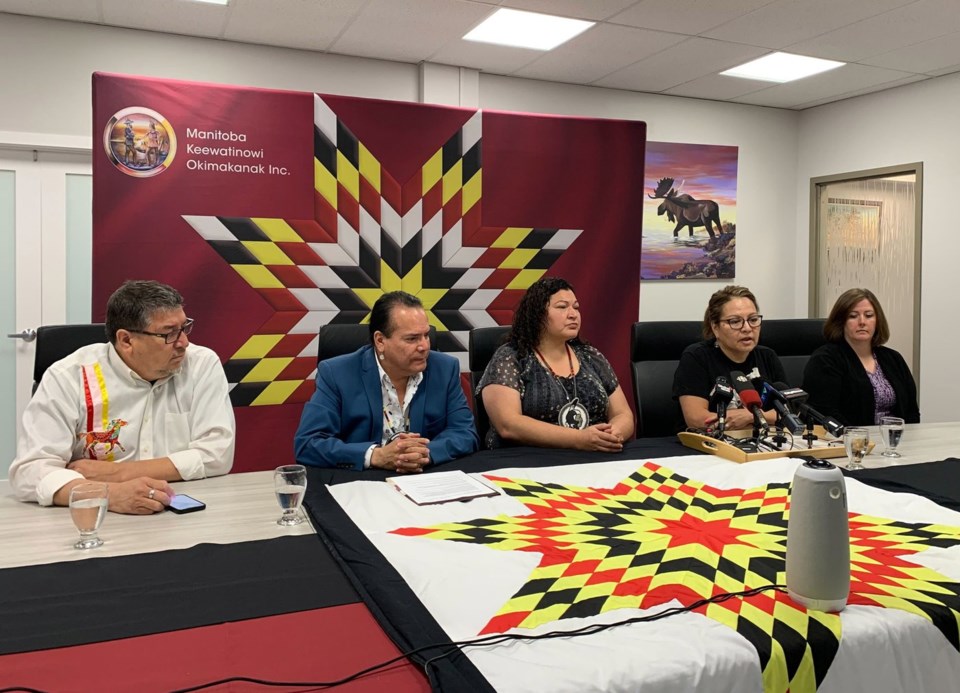WINNIPEG — First Nations chiefs in northern Manitoba are calling for restrictions on alcohol purchases following an uptick in violent crimes, including a series of stabbings in one community over the weekend.
"When someone goes into a liquor store and they purchase a case of 60-ounce bottles … they're obviously bootlegging," Acting Grand Chief Angela Levasseur, with Manitoba Keewatinowi Okimakanak, said Tuesday.
"Where is the regulation? Why is the government aiding and abetting bootleggers by allowing people to purchase these mass quantities of alcohol without a permit?"
The advocacy group for some northern Manitoba First Nations said it has seen a 40 per cent increase in violent acts in the communities it represents since 2021.
Levasseur is calling on the federal and provincial governments to stop the flow of illicit drugs and alcohol into those communities.
The province said there are restrictions in place at some liquor vendors in northern Manitoba that limit how much an individual can purchase in a day.
Those restrictions apply at private vendors in Leaf Rapids, Lynn Lake, Wabowden, Snow Lake, Gillam and Riverton, as well as at provincially owned Liquor Marts in The Pas and Thompson. They don't apply in Winnipeg.
Levasseur added some of the factors that have contributed to the rise in violence include poverty, addictions and mental health issues.
"We're not seeing enough work done in terms of trauma-informed and culturally appropriate healing," she said.
The O-Pipon-Na-Piwin Cree Nation, also known as South Indian Lake, recently imposed a curfew and declared a state of emergency after at least two people were wounded in stabbings over the weekend, including one who was taken to hospital in Thompson.
RCMP previously said one stabbing victim was taken to the northern city with non-life-threatening injuries and a suspect was arrested, while another person was treated at the community's nursing station for a reported stab injury to their hand.
Over the next few weeks, the First Nation is to enforce a curfew of 10 p.m. to 6 a.m. for everyone under 18, and midnight to 6 a.m. for adults.
The community has also set up a checkstop to search for drugs, alcohol and weapons while the curfew is in effect.
Chief Shirley Ducharme has attributed the escalating violence to drug and alcohol use.
She said the crisis did not happen overnight, but is a result of decades of systemic neglect, disregard of First Nations rights and exploitation of First Nations lands by provincial and federal governments.
"These actions have created profound social impacts contributing to the intergenerational and multi-generational trauma," said Ducharme.
She said governments must work collaboratively with First Nations to produce community-driven solutions rooted in culture and tradition.
"The era of temporary fixes and superficial support must end."
The province's justice minister said his office has reached out to Manitoba Keewatinowi Okimakanak to discuss the public safety issues in northern First Nations.
"We look forward to meeting as soon as possible to discuss opportunities to partner and address the challenges they have raised," Matt Wiebe said in a statement.
"We continue to advocate for action and greater resources from the federal government to fill RCMP vacancies and to support First Nations to deliver policing and keep communities safe.”
The federal government did not immediately respond to a request for comment on Tuesday.
Levasseur is also advocating for federal dollars to support a First Nations policing service in northern Manitoba.
"We know better than anyone else how best to police our First Nations communities. If the government wants to stop seeing headlines like this, then they need to step up and provide our community with the resources, the funding and the support to put an end to this violence," she said.
Manitoba Keewatinowi Okimakanak estimates there are about a handful of First Nations in the north that do not have a full-time RCMP detachment. Instead, the communities are serviced by RCMP patrols, which can lead to chaos, said Levasseur.
The Manitoba First Nations Police Service has eight detachments in the province, with one in a northern First Nation.
This report by The Canadian Press was first published Aug. 20, 2024.
Brittany Hobson, The Canadian Press




